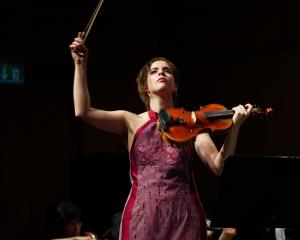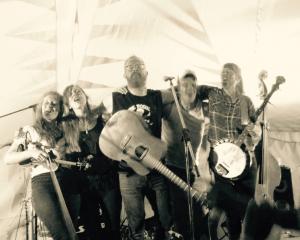At other times, the rhythm is, well, flaccid; hopes of syncopation are as distant as a warm Pacific island is to a coolish autumn night in Alexandra.
Yet here sit seven adults, joined in an endeavour to explore the potential of the ukulele. Here we go: Plinka, plinka, plink. Plinka, plinka, plunk.
And before you say, "The ukulele? Good grief; I'd rather read a feature about that middle-aged British woman who stunned everyone on Britain's Got Talent", spare a few minutes and behold the joy that can be imparted by the pressing of just one finger to one string.
In standard tuning, such ministrations will give you a C chord.
And as most songwriters and players of others' tunes know, there is no shortage of classics based on that particular major triad (we're talking harmonic structure here, not the Asian underground).
That inherent accessibility is the prime reason Alexandra ukulele tutor Bruce Macdonald picked up the instrument six and a-half years ago.
Required to perform at a Scottish ceilidh while exploring his family roots in the Hebrides, he bought a lesson book, a cheap ukulele and learnt a few songs. Now, he teaches others.
Such is the demand for Macdonald's inaugural six-week course, he has had to split the class into two separate sessions.
"When I got asked to take these courses I was blown away by the response. We had 17 people sign up.
"Hopefully, I've whetted the appetite of some people. It's a passion for me. I also play the guitar but I'm much more confident on the uke."
If chart figures, politicians and others are to be believed, New Zealand is head over heels with the ukulele.
In a speech to open the inaugural Kapono International Ukulele Festival in Auckland in late 2007, former arts minister Judith Tizard confessed the ukulele was one of her favourite instruments.
Apparently, she has even been caught on camera playing a ukulele on the steps of Parliament.
"I am personally delighted that this humble instrument is currently experiencing a worldwide resurgence.
"Here, in New Zealand, this revival is being led by Pacific Island string bands; it features in the theme tune for the irreverent bro'Town and is a highlight of the music of a number of well-known artists," Ms Tizard said, pointing to the music of, among others, Neil Finn and the Phoenix Foundation's Samuel Flynn Scott.
More recently, the Wellington International Ukulele Orchestra's EP, A Little Bit of Wonderful, has topped the Independent Music New Zealand album chart for three successive months (January to March) this year.
Of the five songs, all but one are covers and include Ruby, Don't Take Your Love To Town, Israelites and Feliz Navidad.
Its eclectic nature obviously appeals; according to IMNZ, it was the biggest-selling New Zealand record for December, 2008.
Age Pryor, who, with Bret McKenzie, of Flight of the Conchords fame, founded the Wellington International Ukulele Orchestra in 2005, is happy the status of the humble four-stringer is being elevated.
"It's totally amazing. We're hearing about new things happening all the time.
"A friend's dad . . . his first serious instrument was a ukulele. And he got so much grief for it. He had to hide the fact that was the instrument he was learning. That was about 40-45 years ago, I guess.
"Looking at what we've been doing as a group and what others like the Ukulele Orchestra of Great Britain and James Hill have been doing, it proves that it's an instrument of worth."
Otago audiences will be able to form their own opinion on the instrument next week, when the Wellington International Ukulele Orchestra performs a series of sold-out concerts (without Bret McKenzie) as part of Wanaka's Festival of Colour.
And those who still harbour doubt might like to jump on the internet and search for James Hill's rendition of One Note Samba, in which the Canadian-schooled Kiwi explores the ukulele's full range of percussive and melodic extremes.
As Pryor says: "As soon as you see one good person playing, people think, `oh that's cool'."
Pryor is no newcomer to music.
A Wellington jazz school graduate and member of the popular Fly My Pretties collective, he is also an accomplished guitarist and songwriter who has released two solo albums, his 2003 debut City Chorus and 2007's Shanks' Pony.
Though he has only been playing ukulele for three and a-half years - exactly the same time as his orchestra has been going - the side project has now become his main squeeze.
"Me and Bret McKenzie set it up. The two of us were discussing concepts. We wanted to start a band that was fun, just jamming, singing, that kind of thing, rather than a serious career band.
"We were working hard on other things at the time and wanted something we could relax with, something a bit more social.
"Our band developed in a really random way, without anyone knowing where it was going. It still is. People were just turning up.
"We had our first jams in the Deluxe Café in Wellington.
"We were just sitting round the table, maybe with a couple of charts printed off the internet, and someone's friend would pop in and go, `ah, I've got a ukulele - I'll go get it', and they'd join in.
"We went from three or four people to 12 in a really short time.
"I was never passionate about the ukulele.
"I just approached it as another instrument, but I have ended up being swept up in it and there is no way I would have guessed the impact it would have on my life.
"I remember reading something from Neil Finn, who said if he wrote a song on ukulele and it worked, he knew it would work on any other instrument.
"That has stuck with me. On the guitar, you might feel like you need to get a bit fiddly here or there.
"The ukulele takes away all that worry and self-consciousness."
• Mike Dickison, author of the instructional book Kiwi Ukulele: The New Zealand Ukulele Companion, agrees.
It may be regarded as "happy little dwarf guitar" by some, but the lack of pretension surrounding the instrument provides a joyful flipside.
"It's a fully-fledged musical instrument that, unlike the guitar, is easy to play.
"It does have a wistful tone because of the way the strings are tuned, but it's good for both happy and sad," Dickison explains.
"The biggest obstacle is that people expect you play lame Hawaiian music, or Tiptoe Through The Tulips.
"But that's also an advantage, as they're suitably impressed to find you can play Split Enz or the Ramones with it, too."
Dickison started playing the instrument four years ago.
While finishing his PhD in the United States and needing some distraction, he joined a regular "uke jam" at a North Carolina music shop.
On returning to New Zealand, Dickison began a fortnightly ukulele group in his lounge in Lyttelton.
Recently, he has established the Okeover Ukulele Orchestra, based at the University of Canterbury.
He knows of at least three other ukulele groups in Christchurch.
"When I left the USA, the ukulele renaissance was in full swing. It's just getting started here, thanks mostly to the Wellington International Ukulele Orchestra.
"Since writing the book I get two or three emails a week from folks around New Zealand who have started ukulele groups or teach ukulele in schools.
"In many ways it's a better starter instrument for kids than the recorder - and I speak as one who played the recorder in an early music ensemble.
"The kids can sing; they learn some chord theory; and it doesn't annoy parents as much."
Kiwi Ukulele is now into its third print run.
According to Dickison, more than 4000 people have downloaded the free chord chart available on the book's companion website of the same name, which features a range of audio clips, including common strumming patterns.
"When I got back home, I realised there was no New Zealand ukulele book: kids were learning Australian folk songs from an Aussie book. So I decided to write one.
"I'd never written a book before, but I was working as a graphic designer and realised I could do the text, layout, diagrams, and illustrations myself.
"I asked players from around the world for tips - there's a big internet ukulele community."
Back in Alexandra, it's the live interaction between performer and audience or tutor and pupil that provides the biggest thrill for Macdonald.
"I'm constantly blown away by the stuff you see on You Tube and stuff, but I get a real buzz from standing up on stage and playing a tune and my insurance customers standing there with their mouths open, pointing at me, saying, `we didn't know you could do that'.
"I hope I do get the chance to grow old playing it, but I'm of the theory that you are either green and growing or ripe and rotten.
"From that point of view, I've still got a lot to learn."
Macdonald has recently sold his insurance business.
Next month he sets off on a world tour that could take some time. He's taking his ukulele, of course. On the itinerary, again, is Scotland. There, the party invitations come with strings attached.
A bit of history
The ukulele, known as the braguinha in its native Madeira, arrived in Hawaii on August 23, 1879, aboard a ship carrying 419 Portuguese settlers.
The instrument moved from turn-of-the-century Hawaii to popularity on the US mainland, influencing Tin Pan Alley song writers and, later, performers as diverse as Arthur Godfrey, Tiny Tim and Joni Mitchell.
Where there's smoke
Blue Smoke, written by Ruru Karaitiana and regarded as the first record wholly produced in New Zealand from composition to pressing, features ukulele.
According to the NZHistory.net website, Karaitiana wrote Blue Smoke on the troopship Aquitania, in 1940 off the coast of Africa, when a friend drew his attention to some passing smoke.
Back in New Zealand, Karaitiana assembled a quintet in 1947.
In October 1948, in Wellington, the quintet recorded a version of Blue Smoke with singer Pixie Williams.
The backing music was Hawaiian-style, and the instruments included ukulele, guitars and a lap-steel.
In February 1949, the 78rpm disc featuring the song provided a debut hit for the New Zealand-owned Tanza (To Assist New Zealand Artists) record label.
The song topped New Zealand radio hit parades for six weeks and sold more than 20,000 copies within a year.
In 1952, Karaitiana became the first New Zealander to gain an Australasian Performing Right Association award for sales of Blue Smoke and a later hit, Let's Talk It Over, which sold more than 10,000 copies.
Catch them
The Wellington International Ukulele Orchestra performs the following dates as part of Wanaka's Festival of Colour:
> Wednesday, April 29, Glenorchy Hall
> Thursday, April 30, Luggate Memorial Hall
> Friday, May 1, Arrowtown Athenaeum Hall
> Saturday, May 2, Luggate Memorial Hall
> Sunday, May 3, Infinity Crystal Palace, Wanaka.












